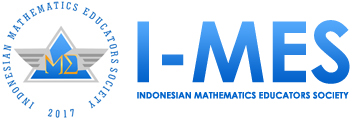Ethnomathematics in Heritage: Exploration from Sonobudoyo Museum Yogyakarta
Abstract
Keywords
Full Text:
PDFReferences
Anhalt, C. O., Staats, S., Cortez, R., & Civil, M. (2018). Mathematical modeling and culturally relevant pedagogy. Cognition, metacognition, and culture in STEM education: Learning, teaching and assessment, 307-330. https://doi.org/10.1007/978-3-319-66659-4_14.
Ascher, M., & Ascher, R. (1986). Ethnomathematics. History of science, 24(2), 125-144. https://doi.org/10.1177/007327538602400202.
Begum, S. (2009). Grounded Theory: A New Theoretical Approach to Qualitative Research. Journal of Sociology, 1(2).
Budiarto, M. T., & Artiono, R. (2019). Geometry and Its Teaching Issues (A Meta-Analysis Study). Jurnal Magister Pendidikan Matematika (JUMADIKA), 1(1), 9-18. https://doi.org/10.30598/jumadikavol1iss1year2019page9-18
Caughey, J. L. (1982). Ethnography, introspection, and reflexive culture studies. Prospects, 7, 115-139. https://doi.org/10.1017/S0361233300003483.
Chock, P. P. (1986). Irony and ethnography: On cultural analysis of one's own culture. Anthropological Quarterly, 87-96.
Cobb, P., & Hodge, L. L. (2002). A relational perspective on issues of cultural diversity and equity as they play out in the mathematics classroom. Mathematical thinking and learning, 4(2), 249-284. https://doi.org/10.1207/S15327833MTL04023_7.
D’Ambrosio, U., & Domite, M. D. C. S. (2007). The potentialities of (ethno) mathematics education: An interview with Ubiratan D’Ambrosio. Internationalisation and globalisation in mathematics and science education, 199-208. https://doi.org/10.1007/978-1-4020-5908-7_11.
D'Ambrosio, U. (1985). Ethnomathematics and its place in the history and pedagogy of mathematics. For the Learning of Mathematics, 5(1), 44-48.
Fatqurhohman. (2021). Textbook of Set Theory. Klik Media.
Firmansyah, A., Jarmani., & Yuanta, F. (2022). Development of PowerPoint-Based Learning Media for Natural Science on Animal Life Cycle for Fourth Grade Students at Manukan Wetan 1 Elementary School, Surabaya. Jurnal Pendidikan Dasar dan Sosial Humaniora, 1(9), 1995-2000. https://doi.org/10.53625/jpdsh.v1i9.2985
Gersten, R., Jordan, N. C., & Flojo, J. R. (2005). Early identification and interventions for students with mathematics difficulties. Journal of learning disabilities, 38(4), 293-304. https://doi.org/10.1177/00222194050380040301.
Habermann-Little, B. (1991). Qualitative research methodologies: An overview. Journal of Neuroscience Nursing, 23(3), 188-190. https://doi.org/10.1097/01376517-199106000-00011.
Handayani, Wuri. Emilda, Nia. (2018). Aesthetic Pedagogy Based on Local Wisdom through Nusantara Crafts: Cianjur Batik. JOUSA: Journal of Urban Society’s Arts, 5 (2), 59-65.
Irfansyah, F., & putri Siregar, M. A. (2023). Exploration of Ethnomathematics at Deli Serdang Museum. Euclid, 10(3), 527-535.
Litik, B. S. Y., & Argarini, D. F. (2023). Exploration of Ethnomathematics on Historical Artifacts in NTT City. Jurnal Ilmiah Matematika Realistik, 4(1), 79-88. https://doi.org/10.33365/ji-mr.v4i1.2668
Lumbantoruan, J. H. (2023). Evaluation of Students' Difficulties in Learning Mathematics in Complex Variable Material. Journal of Education Research and Evaluation, 7(3), 443-454. https://doi.org/10.23887/jere.v7i3.60532.
Meidinata, M. I., & Raharso, A. T. (2022). The Panggih Ceremony in Javanese Traditional Weddings and Its Relation to the Principle of Monogamy in Catholic Marriage. Dih: Jurnal Ilmu Hukum, 18(1), 374872.
Mendes, I. A. (2022). Society, culture, and cognition: Interconnections In mathematics education. Paradigma, 870-897. https://doi.org/10.37618/paradigma.1011-2251.2022.p870-897.id1256.
Morgan, C. (2014). Social theory in mathematics education: Guest editorial. Educational Studies in Mathematics, 87, 123-128. https://doi.org/10.1007/S10649-014-9572-0.
Mufidatunnisa, N., & Hidayati, N. (2022). Exploration of Ethnomathematics in Monuments and Map Museums in Bogor City. Teorema: Teori dan Riset Matematika, 7(2), 311-320. http://dx.doi.org/10.25157/teorema.v7i2.7231
Nelson, G., & Powell, S. R. (2018). A systematic review of longitudinal studies of mathematics difficulty. Journal of learning disabilities, 51(6), 523-539. https://doi.org/10.1177/0022219417714773.
Nur’aini, I. L., Harahap, E., Badruzzaman, F., & Darmawan, D. (2017). Realistic Geometry Mathematics Learning with GeoGebra. Jurnal Matematika, 6(2), 1-6. https://doi.org/10.29313/jmtm.v16i2.3900
Nurcahyo, R. J. (2020). Preservation of Puro Pakualaman Culture as Historical Tourism in Yogyakarta. Khasanah Ilmu-Jurnal Pariwisata Dan Budaya, 11(1), 66-73.
Özcan, Ö., & Bahadır, E. (2023). Opinions of mathematics teachers and pre-service teachers about the relationship between mathematics and culture. European Journal of Education Studies, 10(10). https://doi.org/10.46827/ejes.v10i10.5053.
Povidaichyk, M., Yurchenko, N., & Shtymak, A. (2022). Social and pedagogical preconditions for the formation competitiveness of future mathematics teachers. Scientific Bulletin of Uzhhorod University. Series: Pedagogy. Social Work,1(50), 223-226. https://doi.org/10.24144/2524-0609.2022.50.223-226.
Putri, A. M. O., Sukmawati, B., & Nugraha, A. S. (2023). Ethnomathematics: Exploration of Jlamprang Batik Motifs Unique to Pekalongan. In SEMANTIK: Prosiding Seminar Nasional Pendidikan Matematika, 1(1), 499-515.
Raisinghani, L. (2021). (Trans-Multi) culturally responsive mathematics:(Re) creating spaces for loving kindness. Journal of the Canadian Association for Curriculum Studies, 19(1), 62-87. https://doi.org/10.25071/1916-4467.40413
Rosa, M., D’Ambrosio, U., Orey, D. C., Shirley, L., Alangui, W. V., Palhares, P., ... & Orey, D. C. (2016). State of the art in Ethnomathematics. Current and future perspectives of ethnomathematics as a program, 11-37. https://doi.org/10.1007/978-3-319-30120-4_3.
Salsabilah, A. P., Rahmah, A. A., Wulandari, A., & Soebagyo, J. (2022). A review of research: exploring ethnomatematics on indonesian traditional games in mathematics learning. Journal of Medives: Journal of Mathematics Education IKIP Veteran Semarang, 6(1), 191-202. https://doi.org/10.31331/medivesveteran.v6i1.1751.
Sariningtias, R., Kusumawardani, N., Yasfi, A., & Syafaat, A. (2020). Difficulty Analysis Learning Mathematics Society and Factors Cause for Junior Secondary Students. In Proceeding International Conference on Science and Engineering 3, 635-638. https://doi.org/10.14421/icse.v3.578
Setiana, D. S., Ayuningtyas, A. D., Wijayanto, Z., & Kusumaningrum, B. (2021). Exploration of Ethnomathematics at Kraton Yogyakarta Train Museum and Its Integration into Mathematics Learning. Ethnomathematics Journal, 2(1), 1-10. http://dx.doi.org/10.21831/ej.v2i1.36210
Setiawan, I., & Hendriana, B. (2021). Analysis of math learning difficulties in students mts n 1 pandeglang in the covid-19 pandemic. Daya Matematis: Jurnal Inovasi Pendidikan Matematika, 9(3), 194-199 https://doi.org/10.26858/jdm.v9i3.25879.
Soebagyo, J., Andriono, R., Razfy, M., & Arjun, M. (2021). Analysis of the Role of Ethnomathematics in Mathematics Education. ANARGYA: Journal of Mathematics Education. ANARGYA: Jurnal Ilmiah Pendidikan Matematika, 4(2), 184-190. https://doi.org/10.24176/anargya.v4i2.6370 b
Syukur, M. (2020). Reciprocity in the Life Cycle of the Bugis Community. Neo-Societal, 5(2), 99-111. http://ojs.uho.ac.id/index.php/NeoSocietal/index
Tall, D., & Razali, M. R. (1993). Diagnosing students’ difficulties in learning mathematics. International Journal of Mathematical Education in Science and Technology, 24(2), 209-222. https://doi.org/10.1080/0020739930240206.
Walidin, W., Saifullah, & Tabrani. (2015). Qualitative Research Methodology & Grounded Theory. FTK Ar-Raniry Press.
Wilson, H. S., & Hutchinson, S. A. (1991). Triangulation of qualitative methods: Heideggerian hermeneutics and grounded theory. Qualitative health research, 1(2), 263-276. https://doi.org/10.1177/104973239100100206.
Yohanes, B. (2020). School Mathematics. Yogyakarta: Elmatera.
Refbacks
- There are currently no refbacks.

This work is licensed under a Creative Commons Attribution-NonCommercial-ShareAlike 4.0 International License.
Indonesian Journal of Ethnomathematics
Indonesian Mathematics Educators Society
Jl. Terusan Jend. Sudirman, Kec. Cimahi Tengah, Kota Cimahi, Jawa Barat 40521
E-mail: [email protected]
ISSN: 2775-8001


